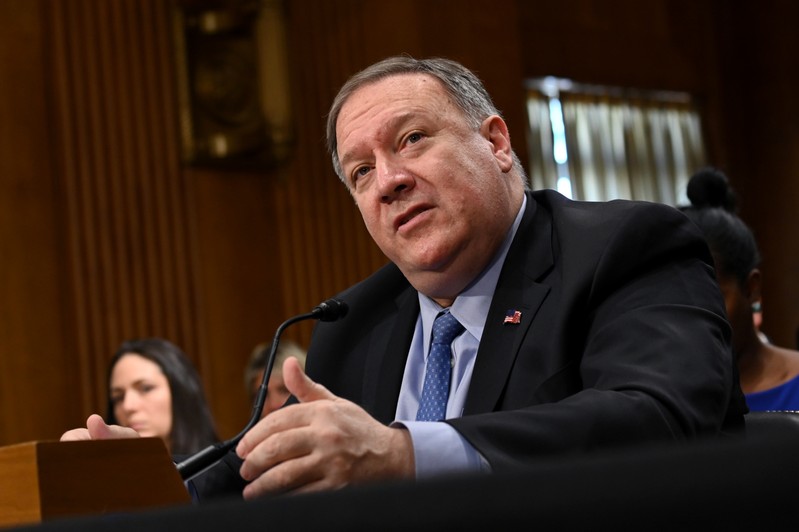
U.S. Secretary of State Mike Pompeo testifies before a Senate foreign Relations Committee hearing on the State Department budget request in Washington, U.S. April 10, 2019. REUTERS/Erin Scott
April 10, 2019
WASHINGTON (Reuters) – U.S. Secretary of State Mike Pompeo declined on Wednesday to publicly say the Trump administration still backs a two-state solution to the conflict between Israel and the Palestinians.
“We are now working with many parties to share what our vision (is) as to how to solve this problem,” Pompeo told a U.S. Senate hearing where he was pressed for a response on the issue.
He said the administration “has been working on a set of ideas” for Middle East peace “that we hope to present before too long,” adding that he hoped they would provide a basis for discussions on resolving the Israeli-Palestinian conflict.
Democratic Senator Tim Kaine asked Pompeo, a former Republican member of the House of Representatives, if he thought a peace agreement including one state for Israel and one state for the Palestinians was an outdated idea.
“It’s certainly an idea that’s been around a long time, senator,” Pompeo responded.
“Ultimately the individuals in the region will sort this out,” the secretary of state said.
Israeli Prime Minister Benjamin Netanyahu secured a clear path to re-election on Wednesday, and a record fifth term in office, with religious-rightist parties set to hand him a parliamentary majority, despite a close contest against his main centrist challenger, a vote tally showed.
In a rare turn during the campaign toward the Israeli-Palestinian conflict, Netanyahu alarmed Palestinians by pledging to annex Jewish settlements in the occupied West Bank if re-elected. Palestinians seek a state there and in the Gaza Strip, with East Jerusalem as its capital.
That came after Trump signed a proclamation during Netanyahu’s visit to Washington on March 25, officially granting U.S. recognition of the Golan Heights as Israeli territory, a dramatic departure from decades of American policy.
The move, which Trump announced in a tweet days prior, was widely seen as an attempt to boost Netanyahu as he ran for re-election on April 9.
Israel captured the Golan in the 1967 Middle East war and annexed it in 1981 in a move not recognized internationally.
The Trump administration has been promising for many months that it would roll out a Middle East peace plan after Israel’s election.
(Reporting by Patricia Zengerle and Lesley Wroughton; editing by Jonathan Oatis)

